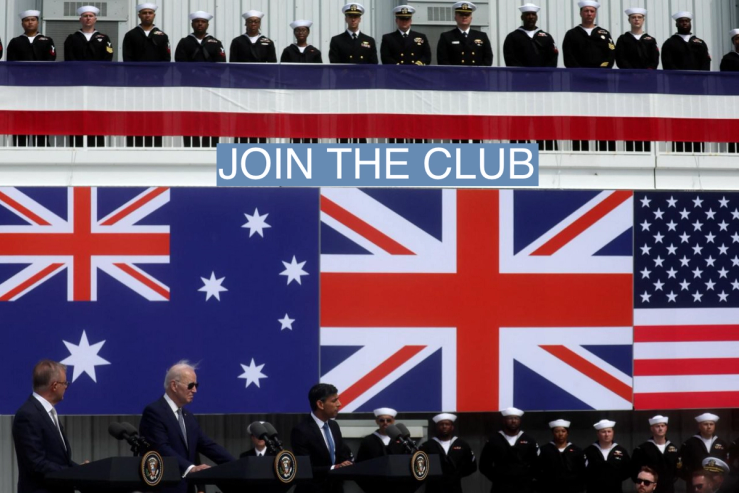The Scoop
The Biden administration is open to adding additional countries to its mammoth new three-way defense partnership with Australia and the U.K. once the pact moves into its next phase, an administration official told Semafor.
U.S. President Joe Biden traveled to San Diego with the British and Australian prime ministers last week to christen their new effort, known as AUKUS, which is currently aimed at developing nuclear-powered submarines that Canberra will purchase for up to $245 billion. Since it was first announced in 2022, defense experts have speculated about whether the partnership might widen to include other nations in Asia seeking to counter China’s military weight, such as Japan, South Korea, and India.
The administration has “no intention” of expanding the current submarine-building project beyond its core trio of countries, according to the White House official. However, the official said that a planned second stage of AUKUS, called Pillar II, could very likely rope in other allies.
That phase of the partnership is expected to involve the research and development of hypersonic and counter-hypersonic weapons, quantum computing, underwater vehicles, artificial intelligence, electronic warfare, and other advanced defense systems.
“We are looking for innovative ways to connect allies in the Indo-Pacific and the Euro-Atlantic,” the official said. “We won’t get ahead of that by naming specific countries, but we do see a world in which we collaborate with other countries on Pillar II.”
Jay’s view
The Biden administration is attempting to build a network of alliances throughout Asia and the Pacific to counter China’s growing military and economic might. That effort has seen it put a new emphasis on “the Quad” — a 16-year-old security partnership between the U.S., India, Australia, and Japan — while building out its military and diplomatic presence in the Pacific and Oceania.
Nonetheless, the announcement of AUKUS last year caught many Asian leaders by surprise, in part because it only included countries from the Anglosphere, despite focusing on the Pacific. Many analysts have argued that to become a true regional security partnership, and avoid the taint of Western chauvinism, the pact would need to add Asian nations, such as South Korea or Japan, which are both seeking to grow their defense alliance with the U.S. and its allies. Japanese Prime Minister Fumio Kishida publicly supported AUKUS last week.
“Not to include Japan would look a little weird,” said Michael Auslin, an Asia scholar at the Hoover Institution, who’s advocated for Tokyo joining the pact.
Both Tokyo and Seoul have vast high-tech sectors that could contribute significantly to many of the Pillar II initiatives, such as hypersonic weapons, AI, and quantum computing. The world’s second-fastest supercomputer, Fukagu, is based in Kobe and was built using Fujitsu Global’s microprocessors. South Korea is also a leader in chip design.
But Japan, as the only nation to have suffered a nuclear attack, is constitutionally barred from using nuclear power for military purposes. Though U.S. and Australian officials stress that AUKUS will be fully compliant with the Nuclear Nonproliferation Treaty — Australia won’t produce any of the nuclear fuel for the subs, nor will their new boats carry nuclear weapons — a nuclear submarine project might be a bridge too far for Tokyo. Working on defense tech like AI and hypersonic missiles would be a much easier entry point.
Partnering with Asian countries on some aspects of AUKUS but not others also makes sense given the complicated security dynamics in Asia. Most countries in the region are wary about Beijing’s growing military might, but also don’t want to be caught in the middle of the growing U.S.-China rivalry. Nations like Indonesia and India collaborate with the U.S. on specific security issues but aren’t going to embrace a formal alliance with Washington, like Japan’s, South Korea’s, and Australia’s. Biden administration officials say their emerging strategy factors in these realities.
“We’re not looking to create a NATO in the Pacific,” the White House official said.
Still, some influential defense leaders in the AUKUS coalition are seeking a more ambitious implementation. The chair of Britain’s influential Defense Select Committee in parliament, Tobias Ellwood, told The Australian newspaper in January: “I would eventually like to see AUKUS and the Quad merge. This would lead to a NATO-lite structure in the Indo-China Pacific. It’s a long way down the road, but I believe that’s where we should be heading.”
The View From China
China is voicing growing alarm about the emergence of AUKUS and claims the transferring of nuclear-powered submarines to Australia will violate the U.N.’s Nuclear Nonproliferation Treaty. Chinese leader Xi Jinping and Russia’s Vladimir Putin both expressed concern about the program at their meeting in Moscow this week, and Chinese officials told Semafor that its potential expansion would destabilize Asia.
“AUKUS is essentially about fueling military confrontation through military collaboration,” said Liu Pengyu, a spokesman for China’s embassy in Washington. “China is deeply concerned and firmly opposed to it.”
Room for Disagreement
Skepticism towards AUKUS remains even among politicians in the three countries already involved. The price tab for Australia is formidable, and some leaders are asking whether Canberra’s defenses might be better shored up using cheaper, non-nuclear powered subs. The multi-decades needed to implement AUKUS means the initiative needs to withstand changes in government — a potential vulnerability.
Former Prime Minister Paul Keating, who supported more economic integration with China during his tenure, accused Australia’s current leadership of making Canberra hostage to Washington’s national security priorities. “What Anthony Albanese has done this week, he’s screwed into place the last shackle in the long chain which the Americans have laid out to contain China,” Keating told Australia’s National Press Club.
Notable
- In 2021, Harvard defense strategists concluded that the era of U.S. military dominance was over and that today Washington would likely lose a war with China over Taiwan.
- Former head of the U.S. naval operations, retired Admiral Gary Roughead, described China’s military expansion into the Western pacific in a useful 2022 podcast episode.


